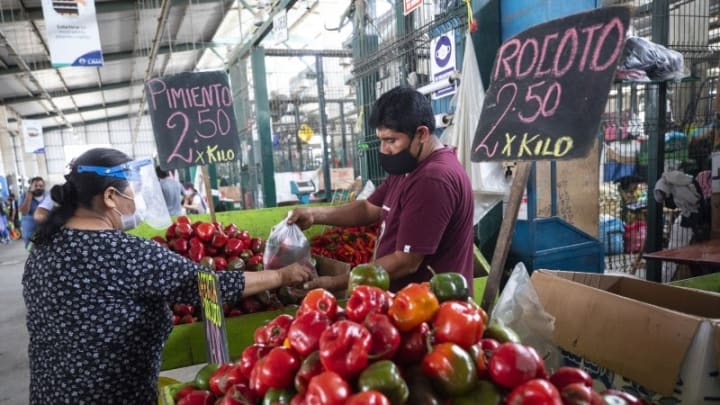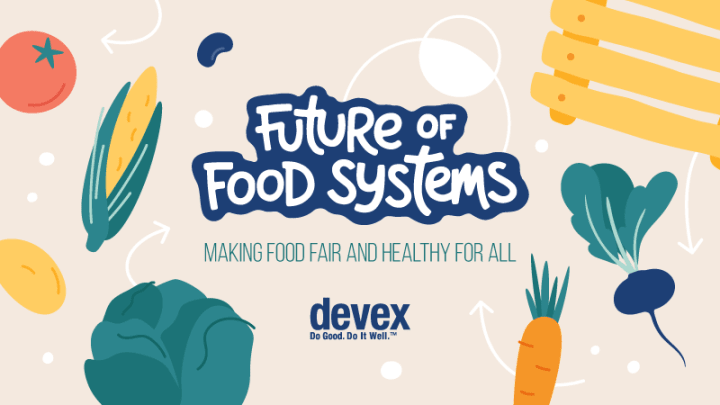
The COVID-19 pandemic has disrupted agricultural output and supply chains globally, exacerbating food price increases at a time when economic contraction and rising unemployment have also hit family incomes in low- and middle-income countries. While this threatens to push the 2030 SDGs on food security further out of reach, trade facilitation efforts such as the African Continental Free Trade Area, or AfCFTA, could help.
The Food and Agriculture Organization Food Price index surged again in January, climbing 4.3% from December to its highest level since 2014. Sub-indices for cereals, sugar, and vegetable oil — all key for meeting basic food needs — experienced the strongest gains, with meat and dairy prices also increasing by a smaller percentage.
Part of our The Future of Food Systems series
Find out how we can make food fair and healthy for all. Join the conversation using the hashtag #FoodSystems and visit our The Future of Food Systems page for more coverage.
The World Bank has also flagged the impact of food price rises on the world’s poorest, noting that its own food price index registered a 14% increase in 2020, while phone surveys across 45 countries suggest more people are eating less.
There are numerous factors at play — ranging from weather and crop infestations to conflict and currency depreciations — making it hard to untangle how much is directly due to COVID-19, according to Marco Sánchez, deputy director at the FAO Agrifood Economics Division.
Trade barriers, with several producers of staple crops such as rice and wheat introducing export restrictions during the pandemic, also mean increases are uneven and localized. For example, Venezuela and Guyana experienced food price increases of nearly 50% as of late July 2010, whereas rises in Kenya were just 2.6%.
COVID-19 worsens food insecurity and nutrition levels
A new report co-produced by UNICEF, FAO, the World Food Programme, and World Health Organization warns that the pandemic, and associated increases in poverty, food prices, and supply chain disruption, threaten to reverse some of the progress made in recent years in battling food insecurity.
Up to 130 million additional people globally are now at risk of becoming acutely food insecure, including up to 24 million people in the Asia and Pacific region, with mothers and children particularly impacted, the agencies said.
“Low-income, food-deficient countries will likely be hit the most, due to the impossibility to ensure sufficient food supplies because of disruptions in the production and trade of basic food commodities.”
— Marco Sánchez, deputy director, Agrifood Economics Division, FAOThe pandemic has impacted not only the quantity, but the diversity and quality, of food in many LMICs, as families switch to cheaper foods that lack vital macro and micronutrients, the report found.
Even before recent food price increases, the high cost of nutritious foods made them unaffordable to lower-income people in all countries around the world, said Sánchez, one of the report’s authors. In 2019, more than 3 billion people globally could not afford a healthy diet, he noted.
Opinion: Global food systems can only be truly transformed with a people’s summit
Agnes Kalibata, the U.N. secretary-general's special envoy for the Food Systems Summit 2021, discusses how food systems can be transformed by sharing platforms, ideas, and learnings on a global level.
“These food price increases will worsen this situation,” he added. “Low-income, food-deficient countries will likely be hit the most, due to the impossibility to ensure sufficient food supplies because of disruptions in the production and trade of basic food commodities.”
The report calls for a systems-wide approach to improving nutrition, with recommended interventions also related to education and health. Those focused on food systems call for improved crop diversification and food fortification, for example, and an emphasis on supporting both supply and demand.
The temptation of trade protectionism
To bolster food demand, Sánchez also recommended the suspension of bilateral loan repayments and collaboration with international creditors for the release of emergency funding. Policies must be nutrition-sensitive, given the heightened importance now of healthy immune systems, he stressed.
To strengthen food supply, producers need financial assistance, with smallholder farmers in particular requiring support to enhance their productivity, reduce pre- and post-harvest losses and ensure their access to food markets, including through e-commerce channels.
Governments and their partners must also focus on minimizing disruptions to national and international transport routes, especially for highly nutritious and perishable foods such as fruits and vegetables, according to Sanchez.
It is also critical that countries continue enacting policies to facilitate trade and avoid the knee-jerk imposition of trade barriers such as tariffs or red tape, according to Michele Ruta, lead economist in the World Bank’s Macroeconomics, Trade & Investment Global Practice. As witnessed during the 2008 and 2011 food crises, such actions can become contagious, with governments responding to each other’s restrictions by imposing their own, he noted.
Although examples of this during the pandemic do raise concern, with Russia, for example, recently imposing taxes on exports of wheat, barley and maize, positive developments including the AfCFTA, which 35 member countries implemented at the start of 2021.
Cut red tape — and generate revenue
In a July 2020 report that Ruta co-authored, the World Bank predicted implementation of AfCFTA could generate $450 billion in potential income gains for its 55 member countries, with $292 billion of this coming directly from trade facilitation measures aimed at cutting red tape and simplifying customs procedures.
By facilitating intracontinental trade, AfCFTA will encourage member countries to specialize in certain food products or crops and increase production, while also helping them cope with localized food shortages caused by shocks such as weather events related to climate change.
From a demand perspective, it also has potential to increase incomes for member countries by 7% by 2035, with the wages of low-skilled workers and women — who spend a bigger chunk of their income on food — benefiting most, Ruta said.
AfCFTA has recognized the importance of balancing trade freedoms with protections for countries whose national budgets are heavily dependent on tariff revenues and for products that are deemed sensitive, about 25% of which are food related.
For example, trade in around 7% of products covered by AfCFTA will be liberalized at a slower pace, over 13 years, while 3% are currently excluded from the agreement. The continent’s LDCs too will have longer to implement the agreement and liberalize their trade.
Ruta argued however that in the long term, increases in trade volumes should more than compensate for reduced tariff revenues for these and other countries. Reductions in red tape and other non-tariff barriers should also encourage the formalization of Africa’s huge — but difficult to quantify — informal trade flows, further boosting revenues, tempering food price increases, and improving food security.
Visit the Future of Food Systems series for more coverage on food and nutrition — and importantly, how we can make food fair and healthy for all. You can join the conversation using the hashtag #FoodSystems.





